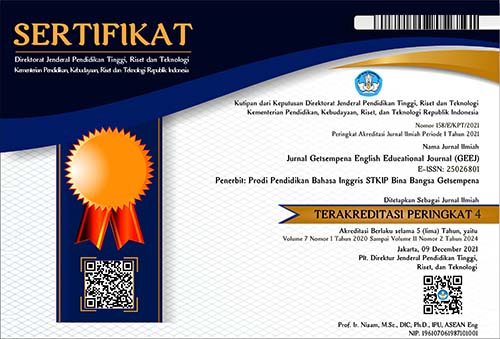IMPROVING THE SPEAKING SKILL OF THE STUDENTS OF STKIP-MB THROUGH THE USE OF THREE-STEP INTERVIEW TECHNIQUE
Abstract
The article provides information about the implementation of cooperative learning: three-step interview among students STKIP MuhammadiyahMuaraBungo (STKIP-MB) and the improvement of their speaking skill on descriptive text through the use of thistechnnique. Participants were 15 students of the first year students at English Department. The method of this research was classroom action research (CAR) which consisted of planning, actioning, observing and reflecting. Data of the research were analyzed by using two methods of data analysis namely quantitative analysis and qualitative analysis. Quantitative data analyses were used to measureand interpretthe data from the task and speaking test, while data which had taken from observation, field note and interview were analyzed by using qualitative data analysis. The research results showed that there was a significant increase of students’ speaking skill on descriptive text over the cycles test. The student’s score rose gradually, it was started at 46.48 in pre-cycle test and being increased 68.17 in the first cycle test. Then, itrocketed at around 75.88 in the second cycle. The improvement of students speaking skill influenced by two factors remained as internal factor and external factor. The internal factors proposed by students’ motivation and their anxiety, whereas external factors concerned with the teaching material and the classroom management.
References
Brown, H. Douglas, and Priyanvada Abeywickrama. (2010). Language Assessment: Principles and Classroom Practices. New York: Pearson Education Inc.
Fussalam, Yahfenel Evi. Improving Students’ Speaking Skill of Descrptive Text by Using Three-Step Interview Technique at Grade VIII.B of SMPN 2 Sarolangun. 2014. Electronic journalFBS State Padang University. Retrieved from http://ejournal.unp.ac.id/index.php/selt/article/view/6746
Gay, L. R. & Araisan, P. (2009). Educational Research: Competencies for Analysis and Application. New Jersey: Prentice Hall Inc.
Hammond, J. (2002). English for Social Purposes.National Centre for English Language Teaching and Research: Macquarie University Sydney.
Harmer, J. (2001).The Practice of English Language Teaching. London: Longman.
Hughes, Arthur. (2003). Testing for Language Lecturer. New York: Cambridge University Press.
Kagan, Spencer & Kagan, Miguel. (2009). Kagan Cooperative Learning. San Clamente:Kagan Publishing
Kajornboon, A. B. (2005). “Using Interviews as Research Instruments.”E-Journal for Research Lecturers, Vol. 13 (9). 28
Kemmis, S., &McTaggart, T. (2008). The Action Research Plannaer.Victoria. Daikin University.
Miles &Huberman.(2004). Qualitative Data Analysis: An Expanded Sourcebook London: SAGE Publications Ltd.
Nunan, David. (2003). Practical English language teaching. New York: McGraw-Hill Contemporary.
O’Malley, J. Michael. (2006). Authentic Assessment for English Language Learners. Boston: Addison – Wesley Publishing Company.
























